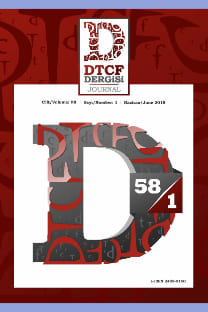MALTA DİLİ ÜZERİNE TARİHSEL BİR BAKIŞ
Malta, küçük bir ada ülkesi olmasına rağmen, bulunduğu konum sebebiyle çok çeşitlimilletlerin izlerinin görüldüğü önemli bir tarihe ve sürekli yenilenen, biçim değiştiren birdile sahiptir. Arapçanın bir lehçesi olan bu dil, Latin hareriyle yazılan tek Sami dildir.Dünya genelinde Maltaca çalışmaları, özellikle son yıllarda artmaya başlamış ve bu dilüzerine konferanslar düzenlenmiş, “Malta Centre”, “International Association of MalteseLinguistics” gibi dil merkezleri/dernekler kurulmuştur. Malta, çok derin dilsel ve politiktarihe sahipken Türkiye'de sadece Malta sürgünleri ve Osmanlı Devleti'nin 1565 yılındakikuşatması üzerine yayınlara rastlanmaktadır. Malta dili ya da edebiyatına dairneredeyse hiç çalışma bulunmamaktadır. Bu makalede, söz konusu dilin kökeni, geçirdiğievreler, edebî dilin oluşumu ve bugünkü Maltaca üzerinde durulacaktır
A HISTORICAL OVERVIEW OF MALTA LANGUAGE
In despite of a small island country, Malta has an important history with the traces of various nations and a constantly renewing, form-changing language because of its location. This language, a dialect of Arabic language, is the only Semitic language written in Latin letters. Maltese studies around the World have begun to grow especially in recent years and conferences on this language were held and language centres and associations were established as “Malta Centre”, “International Association of Maltese Linguistics”. The publications on Malta exiles and the Great Siege of Malta in 1565 are only found in Turkey whereas Malta has a deep linguistic and politic ties. Unfortunately there is hardly any work on this language or its literature in Turkey. In this article, there will be dwelled on origin of the language, its stages, the formation of the literary language and Maltese language of the present.
___
- Agius, Dionisius A. “Al-Miklem Malti: A Contribution to Arabic Lexical Dialectology.” Bulletin British Society for Middle Eastern Studies 17.2 (1990): 171-180.
- Aquilina, Joseph. “Maltese as a Mixed Language.” Journal of Semitic Studies 3.1 (Ocak 1958): 58-79.
- Brincat, Joseph M. “Languages in Malta and the Maltese Language.” Education et Societes Plurilingues 20 (Juin 2006): 7-18.
- Brincat, Joseph M. Maltese and Other Languages: A Linguistic History of Malta. Malta: Midsea Books, 2011.
- Cachia, Mons L. L-Ilsien Malti Ilbieraħ u Llum. Marsa-Malta: Sensiela Kotba Soċjalisti, 1994.
- Cassola, Arnold. Malta: People, Toponymy, Language (MÖ IV. Yüzyıl-1600). Paola- Malta: The Farsons Foundation, 2011.
- Castillo, Dennis. The Maltese Cross-A Strategic History of Malta. America: Greenwood Publishing Group, 2006.
- Fabri, Ray. “Maltese.” Revue belge de philologie et d’histoire 3. 88 (2010):791-816.
- Fabri, Ray. “The Language of Young People and Language Change in Maltese.” Variation and Change: The Dynamics of Maltese in Space, Time and Society. Ed. Sandro Caruana, Ray Fabri ve Thomas Stolz. Berlin: Akademie Verlag, 2011. 89-106.
- Fenech, Edward. Contemporary Journalistic Maltese: An Analytical and Comparative Study. Leiden: E. J. Brill, 1978.
- Grima, Reuben. “Archaeology, Nationhood and Identity in A Small Island State.”Melita Historica 16 (2014): 101-121.
- Hoe, Susanna. Malta: Women, History, Books and Places. İngiltere: Holo Books, 2015.
- Süleyman, Ahmet Talat. el-Luğatu’l-Mâlţiyye ve Usûluha’l-Arabiyye: Dirâse Muķârene. Riyad: Meţâbi‘ Câmiatu’l-Melik Suud, 1990.
- eş-Şidyâķ, Ahmed Fâris. el-Vâsıţatu fi Ma’rifeti Ahvâli Malţa ve Keşfu’l-Muḫabba ‘an Funûnu Ûrubba. Kostantiniyye: Matbaatu’l-Cevâib, 1299.
- Vella, Horatio Caesar R. “The Origin of The Name of Gozo.” The Gozo Observer 27 (2012): 3-20. Web. 27 Kasım 2018.
- ISSN: 0378-2905
- Yayın Aralığı: Yılda 2 Sayı
- Başlangıç: 1942
- Yayıncı: Ankara Üniversitesi Dil ve Tarih-Coğrafya Fakültesi
Sayıdaki Diğer Makaleler
A DISCUSSION OF JAMES J. GIBSON'S THEORY OF VISUAL PERCEPTION IN THE CONTEXT OF EMBODIED COGNITION
TURNING LANGUAGE INSIDE OUT IN BECKETT'S NOT I
RUSÇA VE TÜRKÇEDEKİ ZARF-FİİL YAPILARINDAKİ ANLAMSAL ÖZELLİKLER VE ZAMAN KAVRAMI
TÜRKİYE'DE BİLGİ YOĞUN İŞ HİZMETLERİNİN (BYİH) BÖLGESEL UZMANLAŞMA ÖRÜNTÜSÜ
M Tahsin ŞAHİN, MUTLU YILMAZ, ÇİĞDEM VAROL ÖZDEN
İSTANBUL ÖĞRETMENLERİNİN BURSA SEYAHATİ VE MUSTAFA KEMAL PAŞA'NIN BAŞÖĞRETMENLİĞE GEÇİŞ KONUŞMASI
MODERN TEODİSE DENEMELERİNİN OLANAĞI ÜZERİNE
I.ULUSAL MİMARLIK DÖNEMİNİN ANKARA'DA BİR TEMSİLCİSİ: HARİTA UMUM MÜDÜRLÜĞÜ BİNASI
İSTEMLİ VE İSTEMSİZ OTOBİYOGRAFİK ANILARA ULAŞMADA DOĞRUDAN VE ÜRETİCİ GERİ ÇAĞIRMANIN ROLÜ
